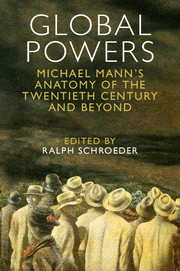Book contents
- Frontmatter
- Contents
- List of contributors
- 1 Introduction
- Part I Theory and history
- Part II Political, economic, military and ideological questions
- Part III American exceptionalism
- 10 Ethnicity, class and the social sources of US exceptionalism
- 11 Mann's big picture of US social citizenship: “Road to World Empire” with Bob Hope
- Part IV Empire
- Part V Response
- Index
- References
10 - Ethnicity, class and the social sources of US exceptionalism
from Part III - American exceptionalism
Published online by Cambridge University Press: 05 April 2016
- Frontmatter
- Contents
- List of contributors
- 1 Introduction
- Part I Theory and history
- Part II Political, economic, military and ideological questions
- Part III American exceptionalism
- 10 Ethnicity, class and the social sources of US exceptionalism
- 11 Mann's big picture of US social citizenship: “Road to World Empire” with Bob Hope
- Part IV Empire
- Part V Response
- Index
- References
Summary
An analysis of the character and consequences of US political development is centrally threaded across Michael Mann's magisterial account of the twentieth century. In fact one of the most compelling arguments of the last two volumes of The Sources of Social Power is that enduring exceptionalism cannot consistently explain US political development. Mann shows that through most of the nineteenth century, and especially in the era of intense industrialism between 1872 and 1902, US labour organization was not much behind that of Britain. But then the United States began to lag compared to other capitalist democracies of the Progressive Era in terms of labour welfare and other social protections, with comparatively weak socialist or trade union organizations, an absence of labour parties and exceptional levels of violent labour repression. It was, Mann aptly argues, a labour movement without a working class. By the New Deal years, however, social welfare provisions and a lib-lab welfare regime had generally caught up to make it again unexceptional, and union membership in the 1940s was roughly comparable to that of other industrialized states – before falling behind once again in the post-Second World War conservative drift (Mann 2012 Vol. 3: ch. 3, 8; 2013 Vol. 4: ch. 3).
This account is powerful and persuasive. Mann (2013 Vol. 3: 70–74; 1993: 642–644) shows that labour's Progressive or industrial era weakness involved a number of possible factors, concluding that while a certain class organization was indeed present in the 1890s and 1900s, broad class identities eventually ‘re-tracked’ into a combination of localism, sectionalism and factionalism. Region and sector generally outmaneuvered class and prevented lib-lab politics, while in the South race was determinative. So these distinctive racial and regime crystallizations, including an exceptional level of domestic militarism, meant that underlying sectoral, regional, ethnic/racial diversities and localized politics undermined class solidarity, making it hard to mobilize on a class basis (Mann 2013 Vol. 3: 70–74, 172; Vol. 4: ch.3).
Taken together, these findings imply a central tension around US exceptionalism. In its formative industrial decades, the United States was also characterized by a complex and paradoxical combination of repression and liberalism.
- Type
- Chapter
- Information
- Global PowersMichael Mann's Anatomy of the Twentieth Century and Beyond, pp. 185 - 208Publisher: Cambridge University PressPrint publication year: 2016



